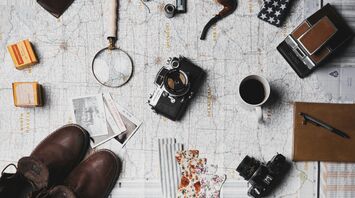Navigating Travel Anxiety: Expert Insights for a Calmer Journey

As travel becomes an integral part of modern life, not everyone experiences the same thrill and excitement when embarking on an adventure. For many, the idea of venturing out into the world brings about feelings of anxiety—ranging from mild discomfort to overwhelming fear. Travel anxiety is a common yet often overlooked condition, affecting millions of people globally. However, understanding its roots and employing expert-recommended strategies can transform this challenge into a manageable experience.
The Roots of Travel Anxiety: A Multifaceted Issue
The causes of travel anxiety are as varied as the people who experience it. Some travelers may worry about unforeseen circumstances, like missed flights or sudden changes in plans. Others might feel uneasy due to unfamiliar environments, language barriers, or the loss of control that often accompanies long-distance journeys. In more severe cases, anxiety can manifest as a fear of flying, being in crowded spaces, or even leaving the comfort of one’s home.
Dr. Chloe Carmichael, a clinical psychologist, points out that this type of anxiety often stems from a natural reaction to the unpredictability of travel. "When people travel, they are exposing themselves to new stimuli, which can feel overwhelming for individuals who thrive on routine and control," she explains. Essentially, it's the uncertainty that triggers feelings of unease. Understanding this origin can help travelers develop the awareness necessary to tackle their fears head-on.
Tips for Managing Travel Anxiety
Though travel anxiety can feel isolating, experts stress that it is both manageable and, in many cases, treatable. By approaching anxiety with the right mindset and preparing effectively, travelers can regain a sense of control over their journey.
- Advance Preparation is Key Many experts, including seasoned psychologists, emphasize the importance of thorough planning as a strategy to minimize anxiety. Travelers who are proactive in organizing their trips—booking accommodations, planning itineraries, and researching destinations—tend to feel more secure. Understanding the logistics beforehand allows them to anticipate any potential challenges, which significantly reduces the mental load of unknown variables.
- Grounding Techniques to Stay Present Mindfulness, a popular psychological tool, has proven effective in mitigating anxiety during travel. Breathing exercises, meditation, or even simply focusing on one’s surroundings can help travelers stay in the moment and avoid spiraling into negative thoughts. Grounding techniques allow the brain to focus on present reality, diminishing the power of anxiety-driven "what-if" scenarios.
- Building Flexibility Into Your Plans While preparation is crucial, so is the ability to stay adaptable. According to experts, travelers who allow some leeway in their schedules and embrace the idea that things may not always go as planned tend to experience less stress. When setbacks are perceived as part of the journey rather than as disruptions, the mental strain decreases, making it easier to maintain a calm demeanor.
- Harnessing the Power of Positive Visualization Another key tool in managing travel anxiety is positive visualization. This technique involves imagining oneself in the desired travel scenario and focusing on the positive aspects of the journey. Whether it's visualizing a smooth flight or a relaxing beach day, training the mind to anticipate good outcomes helps alleviate fear and apprehension.
Overcoming Specific Travel Triggers
Different travelers may experience distinct triggers, and understanding these can be crucial in addressing anxiety. For some, flying is the most daunting part of travel. In these cases, experts recommend familiarizing oneself with the flight process, engaging in calming activities on the plane, or even considering professional therapies, such as Cognitive Behavioral Therapy (CBT), which has been effective in treating phobias and anxieties.
Others may feel uneasy in crowded spaces such as airports or train stations. Here, strategies such as arriving early to avoid rushing, finding quiet corners to relax, and practicing deep breathing techniques can make a significant difference. Knowing your specific triggers is half the battle; the other half is arming yourself with tools to counteract them.
The Role of Technology in Easing Travel Anxiety
In today’s digital age, technology can be a powerful ally in managing travel anxiety. Numerous apps offer guided meditations, relaxation exercises, and even virtual tours that help familiarize travelers with their destinations before they arrive. Some platforms even provide real-time updates on flights, weather conditions, and local transportation, reducing the unpredictability factor that often fuels anxiety.
Additionally, staying connected with family and friends through technology can offer emotional support during challenging moments. Sometimes, just knowing that loved ones are a phone call away can alleviate a significant amount of stress.



















